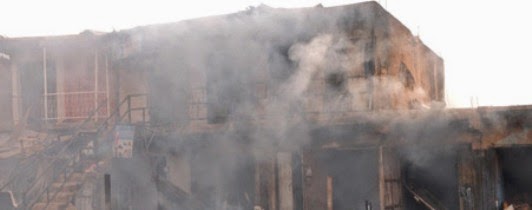 Tuesday’s bomb blast in Yola, Nigeria, killed at least 34 people and injured scores of others. The very next day, two suicide bombers hit the country’s northern city of Kano, killing at least 15 and injuring 53. Authorities are placing the blame for the attacks on Boko Haram, the Islamist insurgency that has wrought havoc on the country over the past few years. The attacks certainly bear the group’s hallmarks: According to CNN, one of the suicide bombers in Kano is believed to have been an 11-year-old girl.
Tuesday’s bomb blast in Yola, Nigeria, killed at least 34 people and injured scores of others. The very next day, two suicide bombers hit the country’s northern city of Kano, killing at least 15 and injuring 53. Authorities are placing the blame for the attacks on Boko Haram, the Islamist insurgency that has wrought havoc on the country over the past few years. The attacks certainly bear the group’s hallmarks: According to CNN, one of the suicide bombers in Kano is believed to have been an 11-year-old girl.
The new acts of violence in Nigeria coincided with the release of a Global Terrorism Index from the Institute for Economics and Peace that named Boko Haram the “most deadly terrorist group in the world.” The report noted that there had been a dramatic surge in the Nigerian group’s violence in 2014, with the number of deaths caused by the group surging by 317 percent to 6,644. Meanwhile, the Islamic State rose to 6,073 deaths. Together, the two groups accounted for more than half of the terror-related deaths in the world.
“The literally fatal conceit of all too many policymakers and analysts with respect to Boko Haram is to constantly underestimate it,” warned J. Peter Pham, director of the Africa Center at the Atlantic Council. “This despite the fact that the group has repeatedly proven itself to be one of the most resilient of its kind and has constantly shifted not only in terms of tactics and operations but also strategy and, indeed, ideology.”
Interest in Boko Haram has ebbed and flowed over the past few years. After the group kidnapped hundreds of schoolgirls in the town of Chibok in April 2014, people from all around the world stood up to take notice of the group. #BringBackOurGirls became an international movement, and the U.S. government intensified its support of the Nigerian government’s fight against the group. Early this year, reports of a Boko Haram massacre that left as many as 2,000 people dead in the northern state of Borno prompted a smaller though still notable international response.
However, the group hasn’t created the same Western panic that the Islamic State has been able to, possibly because the group appears to pose little threat to the average European or American, instead focusing its attacks on the Nigerian government, its people and those in neighboring countries.
“Boko Haram haven’t demonstrated any ambition beyond vague threats to expand their operations outside of Nigeria and the wider Lake Chad area,” Andrew Noakes of the Nigeria Security Network explains. Indeed, in some ways, Boko Haram seems to be a far less ambitious group than the Islamic State, even going so far as to pledge allegiance to that group’s so-called caliph.
Boko Haram isn’t the only major terror group in Nigeria. Another Nigerian group, referred to as the Fulani militants, are believed to have killed 1,229 people in Nigeria. Some reports suggest that this group has formed a link with Boko Haram, though its interests remain far more parochial (the nomadic Fulani people mostly seek greater access to land for their livestock).
The U.S. government has shown reticence when it comes to helping the Nigerian military, largely because Nigerian soldiers have been accused of serious human rights violations in their fight against Boko Haram. One Amnesty International report released in June said Nigerian troops had caused the deaths of more than 8,000 civilians since 2009. “Former detainees and senior military sources described how detainees were regularly tortured to death — hung on poles over fires, tossed into deep pits or interrogated using electric batons,” the report said, naming a number of Nigerian officers who it said should be investigated.
Instead, in October the U.S. government announced it had opted to send hundreds of soldiers to Cameroon, where they will operate a fleet of drones designed to conduct surveillance on Boko Haram. The move appeared to show continued official concern about Boko Haram, even in the midst of the fight against the Islamic State.
[STLtoday]
Support InfoStride News' Credible Journalism: Only credible journalism can guarantee a fair, accountable and transparent society, including democracy and government. It involves a lot of efforts and money. We need your support. Click here to Donate

2 Comments
@theinfostride.com it is shameful and idiotic of you to use Biafra flag to make cover or logo for bokoharam. Until brown envelope journalists like yours are flushed out the zoo Nigeria can never be okay.
Sorry, where did you see Biafran flag in this content? Please chat with courtesy when posting on public forum.